Beth Kephart's Blog, page 167
August 25, 2012
A.S. King, Jennifer Hubbard, and I Pose with a Mystery Man
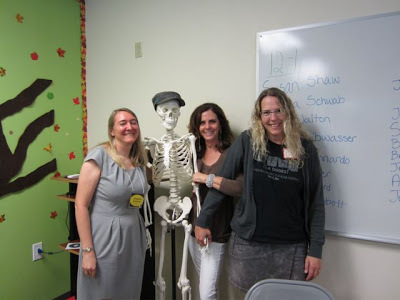
Plenty of wild things happened at Skyanne Fisher's PAYA Festival today. A.S. King hand sold Beth Kephart books, because somebody had to. Beth Kephart signed her books with A.S. King's name, because every tit deserves a tat. Kate Walton looked gorgeous (nothing wild about that one, happens all the time). Skyanne spoke of traveling to humdrum places like Ghana (Sure, Ghana. Of course, Ghana. Who doesn't yawn at Ghana?) Elisa Ludwig showed up in a dress Beth Kephart wanted but Elisa (oddly) wouldn't give it to Beth. Ilene Wong revealed deep secrets. Margie Gelbwasser was adorable. Heather of Children's Book World talked about how much she loves Jessica Shoffel (My Jessica Shoffel? I said. My. Very. Own??) And Beth Kephart got to sit beside the beloved Jennifer Hubbard, a full month shy of her Children's Book World event with Jennifer, David Levithan, and Ellen Hopkins.
And as if that were not enough? There stood this delightful man. Okay, so he could have used a little meat on his bones. Sure, his hat wasn't as vintage as I'd have liked. He was also (sorry!) on the tad short side. But he was upright, strong, and he had a spine, and he could hold his own around three majestic authoresses. Jennifer, A.S., and I fought over him—with the best vocabulary in the land, I can assure you. Then he—not defeated, but slightly bored—suggested that we share.
We're big girls now. Adults. We did.
Thank you, Skyanne and PAYA![image error]




Published on August 25, 2012 12:23
In the New York Times Book Review: reviewing Joyce Carol Oates and James Preller
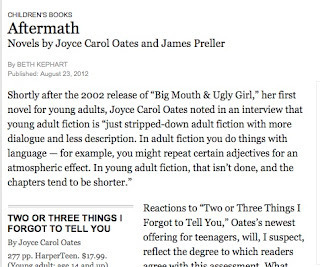
I am honored to be reviewing new young adult novels by Joyce Carol Oates (Two or Three Things I Forgot to Tell You) and James Preller (Before You Go) in this weekend's digital edition of the New York Times Book Review, as part of the Back to School issue.
My thoughts can be found here.




Published on August 25, 2012 04:23
August 24, 2012
a You Are My Only book trailer, as created by a dear librarian
What a day this has become. Reading in the morning. Kindness from all quarters. The Shelf Awarenes s moment, long awaited. Then, this beautiful Small Damages review in Tripping Over Books. Then this Small Damages moment from Jaina Lewis at the Westport Public Library in Connecticut. (Thank you to Serena for telling me about the last two.)
And so I wrote to Jaina to thank her for being so kind. And so she wrote back to share the book trailer above, which she had made as part of her process of sharing You Are My Only with her area eighth graders. I have never seen my work translated into film, and so I have never had the experience of knowing, precisely, how one of my stories might look to another. This is stunning, what Jaina has done, and I am embarrassed that I did not know of it before, else I would have thanked this librarian/film maker much sooner. I share her work then today—out of respect and great appreciation for the time Jaina took to do this, and for her kind words today.[image error]




Published on August 24, 2012 08:39
In Shelf Awareness, remembering my grandmother and reflecting on stories in which time works differently
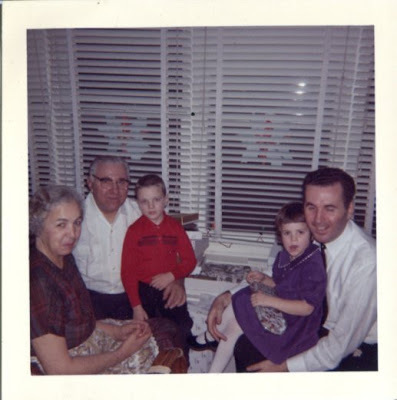
Within every story there are stories, and this morning I am deeply blessed by the chance, in Shelf Awareness, to remember my grandmother and to reflect on the passion I have for creating young adult stories in which time works differently. Jennifer Brown, the children's book review editor for Shelf Awareness, opened this door to me. Her kindness toward me and Small Damages has been remarkable.
Pictured above is my beautiful grandmother, whom I lost on Mischief Night when I was nine. She sits beside my grandfather, who holds my brother on his lap. I am sitting with my beloved Uncle Danny. My mother's family. Sweet memories.
Thank you, Jenny Brown and Shelf Awareness. These are the opening words of my Inklings essay. The rest can be found here:
My books for young adults are frequently shaped by relationships between
those who have so much wanting yet ahead and those looking back, with
pain and wonder. Time works differently in books like these, and so does
memory.




Published on August 24, 2012 07:27
Oliver Sacks, David Foster Wallace, D.T. Max, Joyce Carol Oates, C.K. Williams: A morning spent reading
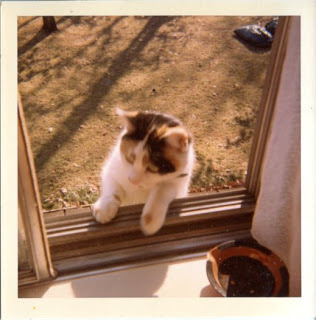
I had time, just now, that quiet time, of reading the magazines that came in last week. Oh, the stolen deliciousness of it all. In The New Yorker, I read of Oliver Sacks on his years dedicated, in large part, to experimenting with large doses of amphetamines, morning-glory seeds, LSD, morphine, and all other manner of neuro-shifters. I thought of all the Sacks I have read these many years, of the seeming innocence of his beguiling childhood memoir, Uncle Tungsten: Memories of a Chemical Boyhood, of his great empathy for patients and ferns and other earthly beings. His New Yorker essay delves, skips, and buries time before it rushes, headlong, toward its hard stop. Sacks had discovered a book on migraines and it had become important to him. He had a revelation about migraines. He ...
... had a sense of resolution, too, that I was indeed equipped to write a Liveing-like book, that perhaps I could be the Liveing of our time.
The next day, before I returned Liveing's book to the library, I photocopied the whole thing, and then, bit by bit, I started to write my own book. The joy I got from doing this was real—infinitely more substantial than the vapid mania of amphetamines—and I never took amphetamines again.
Writing books, Sacks suggests, saved him. The next story I read, an excerpt from D.T. Max's much heralded biography of David Foster Wallace (in Newsweek), suggests how writing would and would not save this genius. The excerpt, which focuses on Wallace's early correspondence with Jonathan Franzen as well as his infatuation with Mary Karr, suggests that this book is well worth reading as a whole. I've always been a huge D.T. Max fan, and I'm certain I will learn from these pages.
In between the Sacks and the Wallace, I found two poems of interest. Joyce Carol Oates has a chilling, compelling poem in The New Yorker called "Edward Hopper's '11 A.M.,' 1926"—worth reading from beginning to end. Oates was one of several authors who contributed to one of my favorite poetry collections (a gift from my sister) called The Poetry of Solitude: A Tribute to Edward Hopper (collected and introduced by Gail Levin). Clearly this project, all these years later, continues to inspire.
Finally, within the pages of this week's New Yorker is a poem by C.K. Williams, one of my favorite living poets. I had the great pleasure and privilege, years ago, of interviewing C.K. in his Princeton home for a magazine story. Later, I saw him read at the Writer's House at Penn. He remains vital, interesting, experimental, and honest, and his new poem, "Haste," is a terrifying portrait of time. From its later phrases:
No one says Not so fast now not Catherine when I hold her not our dog as I putter behind her
yet everything past present future rushes so quickly through me I've frayed like a flag
Unbuckle your spurs life don't you know up ahead where the road ends there's an abyss? ...
My first corporate interview isn't until 1 this afternoon. I'm sitting down to read Truman Capote's In Cold Blood. I figure it's time.
(That above, by the way, is my cat Colors, who lived with me for many years. She's climbing into my bedroom window. I'm eleven or twelve years old. And I'm reading on my bed as she pokes her pink nose in.)[image error]




Published on August 24, 2012 06:08
August 23, 2012
Joining David Levithan, Ellen Hopkins, and Jennifer Hubbard at Children's Book World, September 21
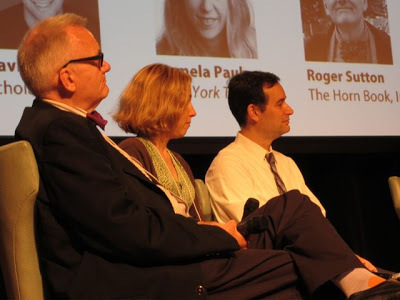
This past May I had the privilege of participating in the uber-fine Publishing Perspectives Conference, What Makes a Children's Book Great? One expert panel featured Roger Sutton (The Horn Book), Pamela Paul (The New York Times), and David Levithan (Scholastic editor and beloved author) in a conversation hosted by the fantastic Jennifer Brown (Shelf Awareness). I sat in the audience admiring those four—their wit, their knowing, their bookly stature.
Today I learned from the pretty darned perfect Jessica Shoffel at Philomel that I'll be joining David Levithan, Ellen Hopkins, and Jennifer Hubbard at Children's Book World in Haverford, PA for a panel/signing. The date is September 21. The time is 7 PM. I'd love to see you there.




Published on August 23, 2012 15:10
Phliadelphia Stories: Push to Publish Conference 2012/be there?
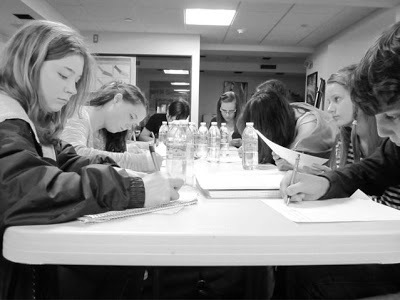
Last March I had the great fun of organizing Young Writers Take the Park with The Spiral Bookcase—an event that provided young area writers with the chance to be celebrated, to be heard, to be published, and to participate in a workshop that Elizabeth Mosier and I conducted. These young writers also spent time talking with my writer friends A.S. King, April Lindner, and Susan Campbell Bartoletti (as well as Elizabeth, of course). It was a great day made even greater by the presence of Christine Weiser, who stands, slim but steadfast, at the whirligig center of Philadelphia's writing world. It was Christine who offered these young writers a chance to be published in her beautiful magazine, Philadelphia Stories, Jr. It was Christine who produced this video of the day.
Among the many other things that Miss Christine does is produce the annual Push to Publish Conference, which is held at Rosemont College each fall. One year I was honored by an invitation to serve as the keynote speaker (and accepted, of course). This year—October 13, 9 AM to 5 PM—I'll be joining the YA panel. Literally dozens of remarkable agents, editors, and writers will be offering advice and telling war stories, even looking over manuscripts, and I never hear anything but extremely good things from the many who attend this conference each year. Who doesn't want a chance to meet with editors and agents? Who isn't beguiled by my friends Kelly Simmons and Kathye Fetsko Petrie? Who doesn't want to hear what the keynoter, Kevin McIlvoy, has to say? Who isn't keen on collecting some shiny wisdom pearls from Gregory Frost, Lise Funderburg, Don Lafferty, Jon McGoran, Catherine Stine, Dennis Tafoya, and Nancy Viau?
I see your eyes lighting up. I can feel you thinking. I hope to see you there.[image error]




Published on August 23, 2012 13:38
Loving Molly Ringwald's Debut Fiction for the Chicago Tribune
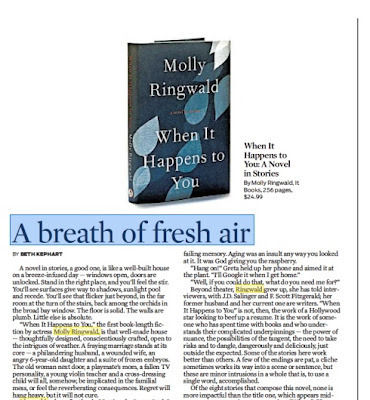
A few months ago, two books showed up at my house for review for the Chicago Tribune, a paper I've had the privilege of writing for over the course of many years. Both had August publication dates. Both were intriguing. The first was by the actress Molly Ringwald, and I, but of course, had corporate work to do. "I'll just see what this is about," I told myself, but once I opened When It Happens to You, Ringwald's debut novel in stories, I could not stop reading. The book contains exceptional writing—chilling, precise, moving. It tells the story of a marriage through interlocking tales. It is polished work, considered work, and I said as much in the Tribune.
This morning I share my first two paragraphs, below. The rest appears in Printers Row, the weekly book magazine that Elizabeth Taylor launched six months ago. Filled with reviews, interviews, stories by readers, children's thoughts, trends, this is essential reading for book lovers and can be ordered digitally (by those of us who don't live in Chicago) for just $29/year. Check out a sample issue here.
Two paragraphs, then, from my Tribune review:
A novel in stories, a good one, is like a well-built house
on a breeze-infused day—windows open, doors unlocked. Stand in the right place, and you’ll feel the stir. You’ll see surfaces give way to
shadows, sunlight pool and recede.
You’ll see that flicker just beyond—in the far room, at the turn of the
stairs, back among the orchids in the broad bay window. The floor is solid. The walls are plumb. Little else is absolute.
When It Happens to You,
the first book-length fiction by the actress Molly Ringwald, is a well-made
house—thoughtfully designed, conscientiously crafted, open to the intrigues of
weather. A fraying marriage stands
at its core—a philandering husband, a wounded wife, an angry six-year-old
daughter, and a suite of frozen embryos.
The old woman next door, a playmate’s mom, a fallen TV personality, a
young violin teacher, and a cross-dressing child will all, somehow, be
implicated in the familial mess—or feel the reverberating consequences. Regret will hang heavy, but it will not
cure.




Published on August 23, 2012 04:22
Small Damages is returned to me, in such new ways, by Jenny Brown of Twenty by Jenny
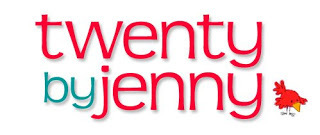
Twenty by Jenny is home to some of the most thoughtful reviews of books written for children and teens—anywhere. That is because Jenny Brown, its creator, has cared about youth literature for all of her adult life—as a teacher sharing stories, as an editor producing them, and as a critic and enthusiast writing for countless publications, including Shelf Awareness. Jenny Brown trails golden light.
But I did not know, until late last night, that Jenny Brown, who had written the exquisite Shelf Awareness review of Small Damages, had also taken the time to reflect on Small Damages in Twenty by Jenny. Her essay is called "Regeneration." It is, in every way, stunning. It taught me about my own book, made me step back with new understanding. This kind of reflection is built of love. And I am so grateful, Jenny Brown. I am.
I am so grateful, too, to the ever-vigilant Serena Agusto-Cox, for letting me know. [image error]




Published on August 23, 2012 03:59
August 22, 2012
thoughts on the next book
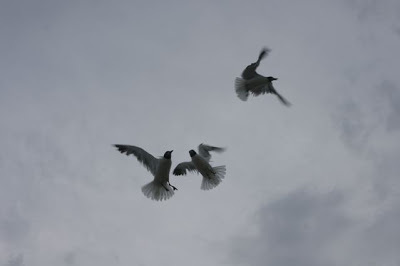
It took me a while to find my next book. The one that is to come after Dr. Radway's Sarsaparilla Resolvent (New City Community Press/Temple University Press/March 2013), Handling the Truth (Gotham/August 2013), and We Could Be Heroes, Just for One Day (Phliomel/Winter 2014). It had occurred to me that I might have said everything I ever had to say. That I had shadowed all the characters, or ideas, or places, that could ever mean something deeply real to me.
And so I read—not to find a next book for my beloved editor, Tamra Tuller, but to satisfy hollow places within. I wrote essays—short pieces about landscapes and people, inquiries into the art of literature or the state of young adult tales, profiles of writers whose work intrigues me, reviews of new and forthcoming books. I planned road trips (south, this coming September) and dreamed of returning to Europe. I listened to Springsteen songs until even I knew it was time to stop. I watched documentary films. I cooked. I went to two different beaches on two different days. I tried not to ask myself, What? Next?
Still, what next crept in, slow, on a sideways angle. It arrived via old memories, new readings, and an urge to take five paragraphs that I wrote a dozen or so years ago and turn them into the start of something new. What next beat its feverish wings at me. I began to buy books, to take notes.
I'm in no hurry. I've written nothing that I'll keep. I'm just thinking about all of this, sure of this one thing: the center of this idea holds and I want to write the heck out of it for Tamra. I have time before the idea becomes a project becomes a deadline. I have time, but I also have (incredible, necessary) a new and urgent passion.
[image error]




Published on August 22, 2012 07:05



